- Remit
-
Date of establishment
19 May 2021
Chair and administrative support area
Chair: Vice-Principal (Education)
Clerk: Morag MacRaePurpose
A steering group of the University Education Committee that develops an approach which addresses embedded racial stereotypes and/or limited perspectives in the curriculum and supports Schools to develop learning materials which offer students a rich diversity of views and role models.
Remit (To be reviewed annually at first meeting of committee cycle)
- Develop a partnership and collaborative approach to working practices and the formulation of strategy, policies and guidance for the delivery of the purpose of the group.
- Develop a set of principles and definitions that articulate the vision for the work of the group and the wider institutional goals associated with the group's purpose.
- Undertake a scoping exercise to understand the existing curriculum practices, and from there identify both good practice and gaps for action.
- Put in place an institutional action plan for the work, and monitor progress on the action plan.
- Support Schools and Professional Services to develop their own plans to address the agreed vision and principles.
- Develop a good practice toolkit and staff training for Schools so that they can:
a. Utilise evidence-based approaches to support their curriculum work
b. Gain literacy on decolonising curricula
- Develop internal and external partnerships that will enrich the work of the group and enable the sharing of good practice.
- Put in place an evaluation strategy.
Reporting line/ Parent committee and interface with other committees
Formal reporting line: University Education Committee
Interface with other committees: School Education Committees; EDIC; Race Equality Strategy Group
Frequency and timing of meetings
A minimum of five meetings per session normally preceding the Race Equality Strategy Group Meetings between 10.00 am-4.00 pm in accordance with University Policy.
Publication of papers
Cognisance will be taken of the University's Publication Scheme and Agenda papers will be made available on web pages/StaffNet.
Date establishment of committee approved/recorded
19 May 2021
- Develop a partnership and collaborative approach to working practices and the formulation of strategy, policies and guidance for the delivery of the purpose of the group.
- Composition
-
Chair
- Vice-Principal (Education)
Membership
- Vice-President for Education of the Students' Association
- Sabbatical Officer
- School student representatives (number tbc)
- School Education Committee Conveners
- Dean for Student Support
- Dean for Educational Innovation
- Dean for Quality Assurance and Enhancement
- Dean of Portfolio Development and Programme Promotion
- Conveners of each of the Race Equality Networks
- Representatives of the Black, Asian and Minority Ethnic Students Forum
In attendance
- Director of Academic Services and Online Education
- Academic Registrar
- Representative for the Centre for Academic Development (CAD)
- University Librarian
Account to be taken of equality and diversity in membership
Membership and meetings
- Membership 2020/21
-

Ruth Taylor
Chair: Vice Principal (Education)
Professor Ruth Taylor is Vice-Principal for Education, Institutional Lead for Race Equality, and Chair of the Decolonising and Enhancing the Curriculum Steering Group.
“I am delighted and excited to be working on this project with a fantastic steering group. We are aiming to develop a set of resources to support colleagues across the university as they consider ways in which they can decolonise the curriculum. The Group will communicate, consult and collaborate with students, colleagues and the wider sector as we take the work forward.

Katerina Vilemova
Postgraduate Intern
Katerina is a student of MRes in Social Anthropology and a postgraduate intern for the Decolonising the Curriculum Steering Group.
“I was delighted when I learned I got the opportunity to be part of the steering group. The work on the project will be definitely challenging, but at the same time, I am very proud to be able to contribute to such an important task”.
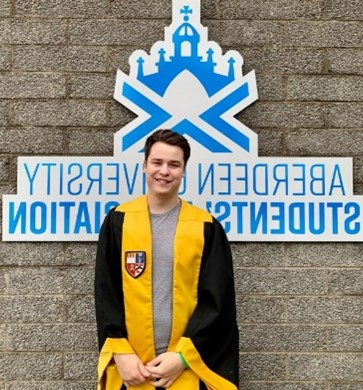
Ondrej Kucerak
Vice-President for Education, AUSA
Ondrej is Vice-President for Education at AUSA, Student Lead for the Enhancement Theme in Scotland, and member of the Decolonising the Curriculum Steering Group.
“This is very exciting time as we explore what our education is truly like, what concepts do we teach and re-examine our teaching methods. It is a great opportunity to co-create inclusive curriculum that reflects the modern composition of our staff and students. Many of our colleagues are extremely enthusiastic about this work and I cannot wait to see the changes we will achieve together.”
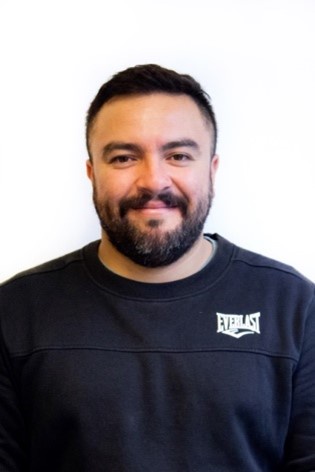
Camilo Torres-Barragan
Vice-President for Communities, AUSA
Camilo Torres Barragán is the first Latin American to be elected Vice-President for communities at the Aberdeen University Students' Union.
“Decolonising the curriculum is in danger of becoming just a catchphrase that is thrown around a lot by universities and we don't want this to be the case in Aberdeen. More than a slogan, it is a complex, challenging process that needs to have racialised people at its core and by definition it includes transferring decisions, responsibilities and resources to them. It means changes in the way things are done across the board and I see the potential for that in this project”

Sofia Puenetes Ferreira
School Student Representative
Sofía Puentes Ferreira is a 4th year student of Economics and International relations at the University of Aberdeen.
“I am thrilled to be part of the Decolonising the Curriculum Steering Group. I moved to Aberdeen from Colombia and have seen the need of such group across higher education in the United Kingdom, therefore I am delighted with this Initiative set by the university”

Abbe Brown
Dean for Student Support
Abbe Brown is Professor in Intellectual Property Law and the Dean for Student Support.
In her teaching, research and leadership roles Abbe is committed to bridging divides and to delivering fairer and workable outcomes, which frequently involves disrupting established norms and structures. Abbe is at the start of her Decolonising the Curriculum journey and she looks forward to learning and contributing.
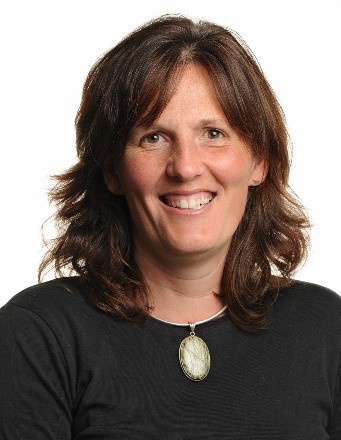
Kirsty Kiezebrink
Deputy Chair, Dean for Educational Innovation
Dr Kirsty Kiezebrink is Dean for Educational Innovation
“ I am really looking forward to working with all members of the Aberdeen University family as we create spaces and resources to enable conversation to develop a curriculum and University culture which incorporates and celebrates all cultures and knowledge systems.”
Vacant
Dean for Quality Assurance and Enhancement

Anne Michelle Slater
Dean of Portfolio Development and Programme Promotion
Professor Anne-Michelle Slater is a specialist in planning law: terrestrial and marine and an expert in legal and policy research and interpretation. In the Law School, she is the lead for Athena SWAN and a member of the EDI committee. Anne-Michelle is also the Dean for Portfolio Development and Programme Promotion and sits on this group because of that role.

Ritu Vij
Convenor of the Race Equality Network
Ritu Vij is Senior Lecturer in Politics and International Relations in the School of Social Science and serves as Co-Chair of the Staff Race Equality Network (REN).
“REN engages colleagues across the university in difficult conversations about the modes of exclusions that structure our disciplinary practices and everyday interactions. Its principal aim is to deepen the ongoing institutional work of promoting equality, diversity, and inclusion on campus. The network is especially invested in working with staff and students to address the key political and practical challenges of decolonizing the episteme, i.e. identifying the legacies of empire and colonization in what counts as generalizable knowledge”.

Vanessa Mabonso Nzolo
Representative of the Black, Asian and Minority Ethnic Students Forum
Vanessa Mabonso Nzolo is a 4th year undergraduate student of Anthropology and International Relations, convenor for The Black, Asian and Minority Ethnic Students' Forum at AUSA, and project lead for the Decolonise Anthropology Student Team.
“As a student-activist, I am happy to join forces with the Steering Group to offer fresh and innovative perspective into the work of our institution. I hope to work as a channel of communication between students and the Group, and work actively towards the realization of projects we need together as a community.”
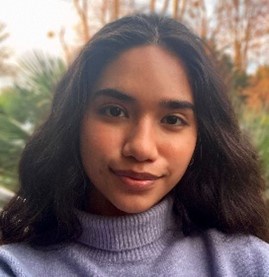
Nurah Niazy
Representative of the Black, Asian and Minority Ethnic Students Forum
Nurah Niazy is a 4th-year Geography and International Relations student and is a member of the Black, Asian and Minority Ethnic (BAME) Students' Forum.
“As a member of the BAME Forum, I am excited to be a part of the Decolonising the Curriculum Steering Group. We will ensure that the concerns and interests of BAME students are made visible. Through initiatives, proposals, and collaborative efforts, we hope to represent student voices as we decolonise the curriculum.”

Ana Payo-Payo
School of Biological Sciences
Dr Ana Payo Payo is a research fellow in animal ecology at the School of Biological Sciences.
“I strive to achieve a more diverse and inclusive academic environment. That is why I dedicate myself to listen to those in less privileged positions and to use the platforms I have access to promote and catalyse the change they want to see in the system."

Mark Whittington
Business School
Mark Whittington is a senior lecturer in Accountancy and Finance with a focus on accountability (“holding to account”) beyond the purely financial.
Mark has been involved with developing partnerships and programmes with international partners for many years. His concern is that all voices can be heard with respect and each culture seen relevant to the discussion. In accounting, the adoption of “International Accounting Standards” might be seen as continuing colonialism and wiping away previous accountability approaches developed over centuries as being no longer valid or needed.

Cheryl Dowie
Business School
Dr Cheryl Dowie is a Lecturer/Assistant Professor at the University of Aberdeen Business School.
She co-leads the Equity, Diversity, and Inclusion (EDI) committee for the Business School. Cheryl's primary areas of research interest are in negotiations/conflict resolution, group decision-making, pedagogy, corporate communication, and cross-cultural management. Her secondary areas of research interest are in gender issues, entrepreneurship, and internationalisation strategies in higher education. Her interests in studying pedagogy and internationalisation strategies, motivates her to learn and understand more about how to enrich knowledge production, reflect on educational inclusivity, and improve discourse among post-secondary students. Furthermore, her desire to evolve into a compassionate and empathetic educator and create an inclusive learning environment for all students, urges her to participate and contribute to this steering group.

Richard Anderson
School of Divinity, History, Philosophy and Art History
Dr Richard Anderson joined the University of Aberdeen in 2020 as Lecturer in the History of Slavery. He researches and teaches the history of Africa and the African Diaspora and is undertaking a two-year study of the legacy of slavery to the University of Aberdeen.
“As a historian of slavery and empire, I am energised and encouraged by the work of the steering group in leading important discussions on how to decolonise teaching and knowledge production within an ancient Scottish university.”

Liz Curtis
School of Education
Dr Liz Curtis is a lecturer in the School of Education and a member of the Decolonising the Curriculum Steering Group.
'It is a privilege to be part of this group, to learn from the experiences and work of colleagues and to make a contribution to the development of ways in which we can all work towards consciously decolonised curricula across the University.'

Israel Osofero
School of Engineering
Dr Israel Osofero is a Senior Lecturer at the School of Engineering. He is also the Race Equality Champion for the School and a member of the Decolonising the Curriculum Steering Group.
“I am excited about the focus of this group, which is to support colleagues as they consider how to decolonise the curriculum. I look forward to working with colleagues across different disciplines at the University, but particularly with colleagues at the School of Engineering as we consider ways to decolonise the engineering curriculum.”

Josh Wright
School of Geosciences
Dr Joshua Wright is a lecturer in Chinese Archaeology in the department of Archaeology and Director of Education for the school of Geoscience.
Josh holds his Ph.D. in Anthropology and has a range of experience working with diverse and international curricula covering Asia, indigeneity, heritage and representation, and materiality. Here at Aberdeen he teaches at all levels of the undergraduate programme.
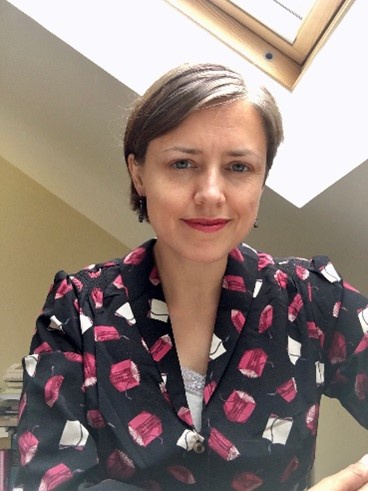
Liz Elliott
School of Language, Literature, Music and Visual Culture
Dr Elizabeth Elliott is a senior lecturer in English and lead on the Decolonising the Curriculum steering group for the School of Literatures, Languages, Music & Visual Culture.
“My role as LLMVC representative on the Decolonising the Curriculum steering group builds on work within my courses in English, which responds to the challenge levelled by Dr Dorothy Kim at white medievalists like me: 'How are you signalling in your classroom that you are not upholding white supremacy when you are teaching the subject loved by white supremacists?' These courses include Queer Times, developed with Professor Tim Baker, which addresses the historical construction of gender and sexuality and their relationship to colonisation. As a white cis scholar, employed within a sector that still has much work to do to address structural racism and the impact of inequitable frameworks in reproducing inequalities, I am conscious that I still have a lot to learn.”
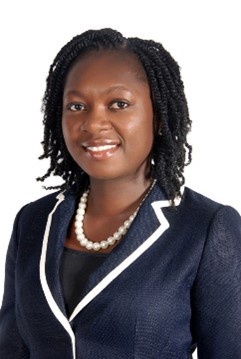
Titilayo Adebola
School of Law
Dr Titilayo Adebola is the Equality, Diversity and Inclusion Lead at the School of Law and a member of the Decolonising the Curriculum Steering Group.
“I am pleased to be working on this project with a brilliant steering group. The steering group seeks to formulate resources to support colleagues across the university as we explore effective avenues to decolonise the curriculum. The resources will be the outcome of intentional consultations and collaborations with students and colleagues.”

Jason Bohan
School of Psychology
Dr Jason Bohan, is Director of Education for the School of Psychology, and School representative on the Decolonising the Curriculum Steering Group.
“We have a very diverse student and staff academic community and I strongly believe that everyone should feel welcome and included. I am very excited to be working on this project and looking at ways we can address these issues.”

Ching-Wa Chung
School of Medicine, Medical Sciences and Nutrition
Dr Ching-wa Chung is a Senior Lecturer at the School of Medicine, Medical Science and Nutrition. He is Lead for Admissions for MBChB, PA and G2M and deputy lead for assessments for Healthcare programmes.
“It has been a journey to learn and work on Decolonising the Curriculum. It is a pleasure to contribute to the important work of exploring the effects of Colonisation on our students' education. I think we can both learn from the work that is already been done, and support our colleagues and students in further work. I am looking forward to what will develop.

Nigel Beacham
School of Natural and Computing Sciences
Dr. Nigel Beacham is Director of UG Pathways for Computing Science, Pedagogical Research Board Member for the Physical Sciences & Engineering Ethics Board, and Convener for the NCS School Education Committee.
Dr. Beacham is a senior lecturer in Computing Science at the University of Aberdeen. He has over 25 years of experience carrying out research into the design, implementation and evaluation of assistive technologies, e-learning systems and user interfaces of educational technologies to support individuals from minority groups. He was a Research Fellow for the Inclusive Practice Project within the School of Education at the University of Aberdeen and is also a STEM ambassador raising children's awareness of computing.
Ritu Vij
School of Social Science
Ritu Vij is Senior Lecturer in Politics and International Relations in the School of Social Science and serves as Co-Chair of the Staff Race Equality Network (REN).
“REN engages colleagues across the university in difficult conversations about the modes of exclusions that structure our disciplinary practices and everyday interactions. Its principal aim is to deepen the ongoing institutional work of promoting equality, diversity, and inclusion on campus. The network is especially invested in working with staff and students to address the key political and practical challenges of decolonizing the episteme, i.e. identifying the legacies of empire and colonization in what counts as generalizable knowledge”.
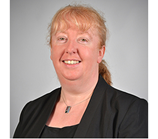
Gillian Mackintosh
Director of Academic Services and Online Education
Dr Gillian Mackintosh is Director of Academic Services & Online Education.
“This is a hugely important project for the University and I am delighted to be a member of the steering group leading this work. I look forward to helping to develop guidance, training and resources to support colleagues in their work to decolonise the curriculum.”
Rachael Bernard
Academic Registrar
Darren Comber
Representative for the Centre for Academic Development

Aaron Thom
Representative for the Centre for Academic Development
Dr Aaron Thom is Educational Development Adviser within the Centre for Academic Development. Aaron gained his MA, MLitt and PhD from the University of Aberdeen; his doctoral dissertation was supervised by John Gash. Aaron's specialism is seventeenth-century Italian art, in particular Caravaggio and his followers. Now coordinator of Principals of Learning & Teaching and the PGCert course Activities, Knowledge & Values he said:
“I'm excited to work on this bold project, not least because of my academic background, but because of the interdisciplinary work I am currently engaged in. I work with PhD students and staff across the University, so I am interested in current pedagogical imperatives in higher education.”

Simon Bains
University Librarian
Simon Bains is University Librarian and Head of Library Services.
The University Library has a vital role in supporting changes being made to the curriculum and a wider responsibility to ensure that its collections properly represent our commitment to inclusivity and diversity. I am absolutely committed to this responsibility, and really pleased to be able to contribute to the work of the Steering Group. I welcome suggestions for new titles for our collections to promote a wider understanding of decolonisation issues.

Morag MacRae
Clerk
Morag MacRae is an Administrative Officer in Academic Services, and clerks the Decolonising the Curriculum Steering Group.“It is a real privilege to be involved in the administrative side of this work, and I am looking forward to seeing where these vital, thought-provoking conversations take us as an institution.” - Agendas
- Minutes
Workstreams
- Workstream 1: Context, definitions and ambitions
-
Context
- What does decolonising the curriculum mean for the University of Aberdeen, and how are we defining the purpose of the work?
- Framing the decolonising the curriculum work so that we are clear about scope and acknowledge the wider issues (e.g. gender)?
- Why this is important / why we are doing this?
- Aberdeen 2040 Strategy - Inclusive; international (in this context perhaps preparing students for engaging in an international experience); challenge-led
- EHRC Racial Inequalities - Universities Challenged
- Race Equality Charter
- What are the key issues e.g. awarding gap?
- Race Equality Strategy Group
- Issues that are important when doing this work (e.g. 'mining' students and colleagues as people of colour for solutions is problematic) and how we have addressed them; how this project will work/has worked.
- Links to other areas such as gender, disability, widening access, etc.
- Acknowledge that this is the starting point - it will take time to implement
Definitions and ambitions
- History
- Definitions, including anti-racist curriculum, race, etc. We have our Definitions agreed through the RESG. Links to ARC project (QAA/Advance HE) and the use of language
- What we mean by a decolonised curriculum
- Where the 'boundaries' of Decolonising the Curriculum are - importance of areas such as how we recruit colleagues, cultural competence of colleagues etc
- Academic freedom / freedom of speech
- Our agreed ambitions as a University
NB: Group identified that decolonising is not the same as diversifying, nor does it equate to building an anti-racist curriculum
- Workstream 2: Evidence-based practice
-
Evidence-based practice
- A review of existing evidence and good practice across the sector, including the QAA Collaborative Cluster. International evidence
- How do students experience university differently? A review of the evidence (including our internal data)
- Link to our overall proposed approach - clarity about our use of evidence
- An evaluation plan for the implementation of Decolonising the Curriculum across the University including a focus on the lived experience of both students and colleagues through the process
- Workstream 3: Leading and managing critical conversations in Schools
-
Leading and managing critical conversations in Schools
- Linked to definitions and ambitions section, a set of resources and tools that will enable colleagues and students to take forward conversations; creating safe spaces to have those conversations and providing safe debrief spaces
- General support
- Specific discipline support; provide field-specific guidance
- Engaging with the concepts; provide the option for members of staff to add content specific to their School linked it to the overarching topic of decolonisation
- Addressing challenge
- Involving students in co-creation, communications, listening, consultation. Inquiry regarding students' opinions on the course curriculum in the context of decolonisation should be included in course feedback form
- Being an ally
- How do we enable wide learning across our colleagues - train the trainer approach?
- Training needs
- Clearly show how terms and concepts seemingly unaffected by colonialism are still influenced by colonial processes
- Workstream 4: Content focused (curriculum design), assessment focused and delivery focused
-
Content focused / curriculum design
- Decolonising the Curriculum 'inventory' - a list of key areas that can be considered when designing curriculum (link to Anti-Racist Curriculum outputs)
- Discipline guidance - how to review curriculum through the lens of decolonisation
- Resources to support all of the above ('How to' guidance)
- How to provide 'additionality' to the curriculum - and how to use this knowledge in the classroom
- Training needs
- Library and resources / readings
Assessment focused
- Decolonising the Curriculum 'inventory' for assessment
- Appropriate assessment - content and approach
- How to develop assessment that is decolonised / inclusive
- Issues to address e.g. timing of assessment in relation to religious holidays and other important events
- Training needs
- British/Western academia has a specific use of sources which not all staff/students are aware of (i.e. plagiarism)
- Staff training / education on the matter of the diverse cultural backgrounds/contexts students come from
Delivery focused (pedagogy)
- Decolonising the Curriculum 'inventory' for pedagogy
- Creating a safe classroom environment that enables engagement, open discussion etc
- How to do this in different environments e.g. lectures, tutorials/seminars, performance, labs, clinical skills, fieldtrips
- How to enhance practice-based environments e.g. healthcare, schools, internships
- The wider institutional environment
- Links to content warning work that is going on
- Training needs
- Workstream 5: Quality assurance and enhancement
-
Quality assurance and enhancement
- Processes required to implement curriculum change - at course and programme levels with clear guidance for colleagues
- University should report on the developments of the decolonising process through the Enhancement Theme as required externally
- Reporting mechanisms to be in place for University Education Committee Aberdeen 2040 meetings (3 times per year)
- Evaluation of the project as part of the QA/E processes (see working group 2 who will develop the evaluation plan. This group will consider the process of reporting and ongoing enhancement from the project)
- Workstream 6: Challenges faced in the classroom
-
Challenges faced in the classroom
- Guidance on how to manage racism in the classroom (e.g. evidence on the challenges that Black, Asian and Minority Ethnic lecturers and students face in the classroom)
- Information on our report and support mechanisms
